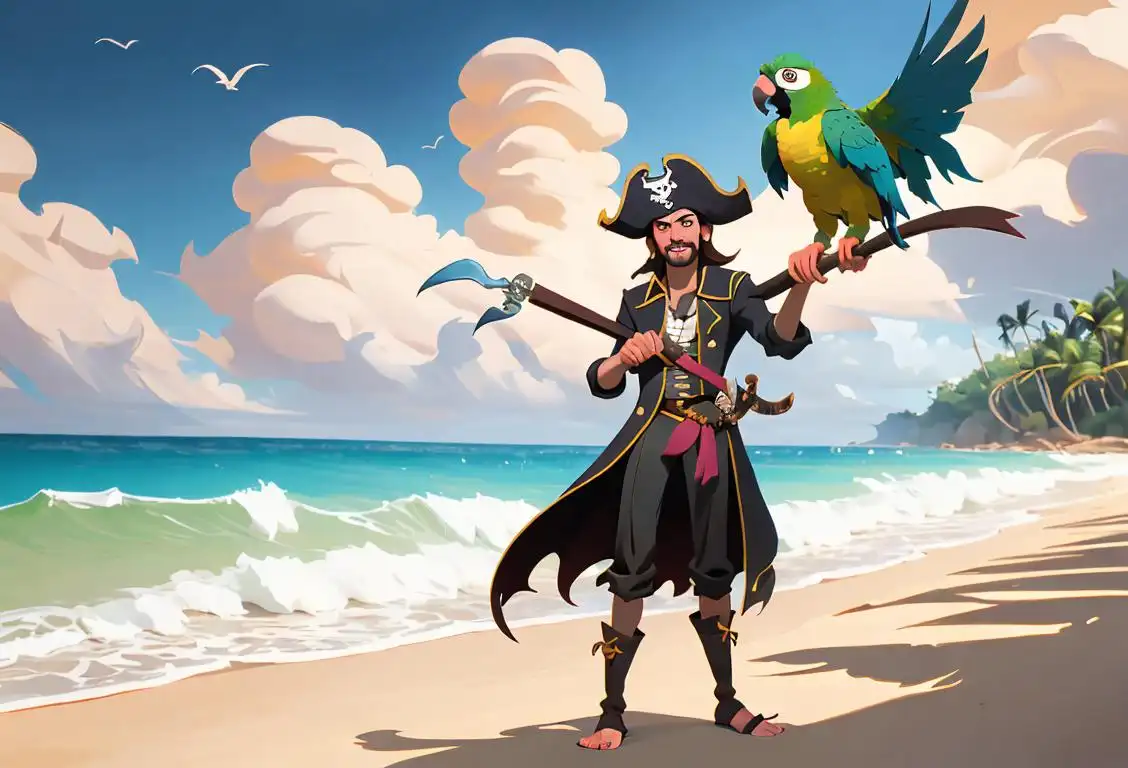National Pirate Day

Avast ye scallywags and prepare to set sail on the high seas of National Pirate Day! This be the day to channel your inner Jack Sparrow, don your finest pirate attire, and let loose with a hearty 'Yo ho, yo ho, a pirate's life for me!'
When is Pirate Day?
It's national pirate day on the 19th September.
The Origins of National Pirate Day
Arrr, matey! National Pirate Day be a celebration of all things pirate, from the swashbuckling tales of old to the modern-day fascination with buried treasure and one-legged seafarers. This jolly holiday be said to have originated on the vast shores of the internet, where pirates of the online realm came together to share their love for all things nautical and plunderous.
But why September 19th, ye may ask? Well, that be the day when brave souls from around the world decided to embrace their inner buccaneer and unite under the skull and crossbones flag of piracy. It be a day to let go of the mundane and set sail on a sea of silliness, mischief, and arrrr-dventure.
Raising Awareness and Having Fun!
National Pirate Day be not just a jolly good time for landlubbers and scallywags alike, but it also serves a higher purpose – raising awareness about the rich history of pirates and their influence on popular culture. It be a day to learn about legendary swashbucklers like Blackbeard, Anne Bonny, and Calico Jack, and the tales that still captivate the imaginations of young and old.
But fear not, National Pirate Day be not all serious business! It be a time for fun and frolic, where ye can let loose with pirate-themed parties, treasure hunts, and even partake in some grog (non-alcoholic, of course). And don't forget to practice yer best 'Arrrs' and 'Shiver me timbers!' – ye wouldn't want to be mistaken for a landlubber!
A Fun Pirate Fact for Ye
Did you know that pirates in popular culture often wore eye patches not because they had a missing eye, but to improve their night vision? By keeping one eye covered, they could quickly switch between the light outdoors and the darkness below deck. Sneaky, eh? So the next time ye see a pirate with an eye patch, be sure to salute their cunning ways!
History behind the term 'Pirate'
14th century
The Birth of the Term
The term 'pirate' originated in the 14th century from the Latin word 'pirata', which comes from the Greek word 'peirates', meaning 'brigand'. During this time, pirates were commonly referred to as 'sea robbers' or 'sea thieves'. However, the term 'pirate' soon gained popularity and became widely associated with those who engaged in acts of robbery and violence on the high seas.
16th century
Golden Age of Piracy
The 16th century saw the rise of the notorious pirates who sailed the Caribbean and the Atlantic during the Golden Age of Piracy. This era lasted from the late 17th century to the early 18th century and marked a period of intense piracy activity. It was during this time that pirates, often portrayed as swashbuckling figures with eye patches and peg legs, terrorized merchant ships and plundered their riches, making their infamy known around the world.
19th century
Era of Privateering
In the 19th century, the term 'pirate' took on a slightly different connotation. Privateering, which involved privately owned ships authorized by governments to attack and plunder the vessels of enemy nations during wartime, became prevalent. While privateers were essentially legal pirates, they were often referred to as 'licensed pirates' or 'government-sanctioned pirates'. This era blurred the line between piracy and legitimate warfare, leading to the term 'pirate' being associated with both illicit and state-sanctioned acts of seafaring plunder.
20th century
Pop Culture Icon
During the 20th century, pirates transitioned from feared outlaws to beloved pop culture icons. This transformation can be attributed to numerous factors, including literary works like Robert Louis Stevenson's 'Treasure Island', which romanticized pirate adventures, and films like Disney's 'Pirates of the Caribbean' franchise, which reinvented the pirate mythology for a modern audience. Today, pirates are symbols of rebellion, adventure, and a bygone era of maritime exploration.
Did you know?
Did you know that pirates in popular culture often wore eye patches not because they had a missing eye, but to improve their night vision?Tagged
romance awareness funFirst identified
19th September 2015Most mentioned on
19th September 2019Total mentions
1392Other days
Suicide Prevention Month Day
Iloveyou Day
Happiness Day
Do Something Nice Day
Compliment Day
Single Ppl Day
Dance Day
Honesty Day
Kiss A Ginger Day
Kissing Fried Chicken Day









